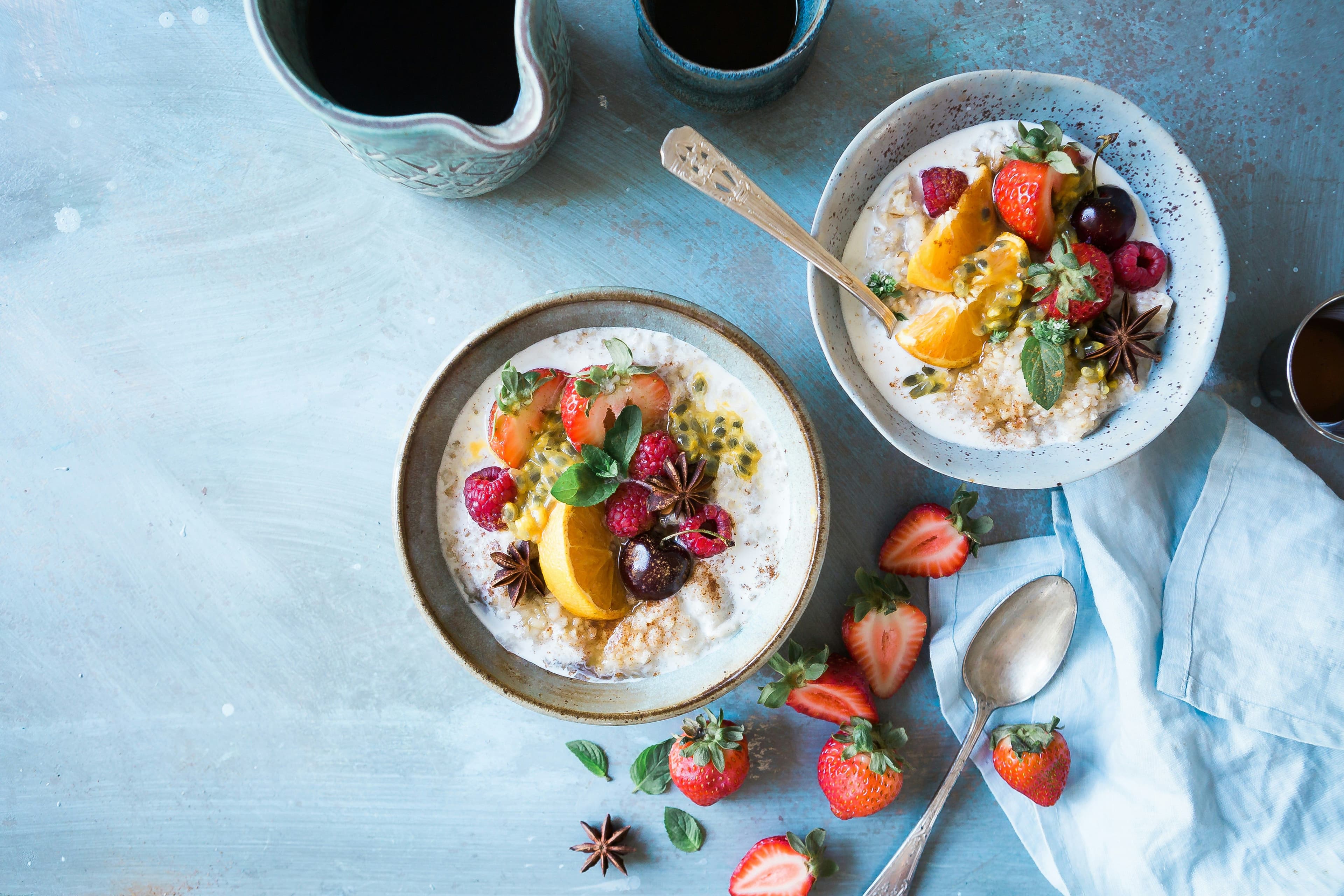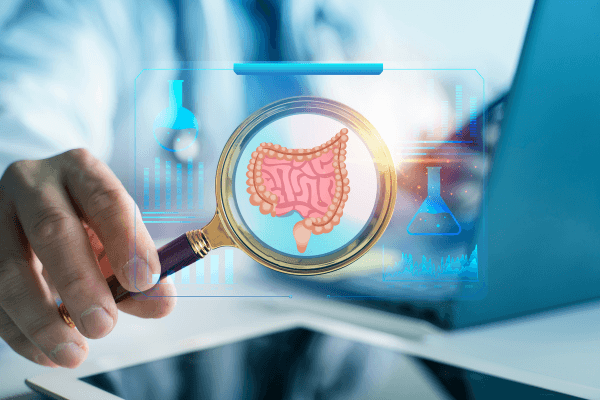Article written by Joanne Talley, RDN, LD, CDCES
Your digestive system, commonly known as your gut, breaks down the foods you eat, absorbs nutrients from them, and uses those nutrients to keep your body working and give you energy. Many people think that their diet is pretty healthy but would be surprised to find out that ultra-processed foods and drinks, like sausages, chips, and sodas, may be putting their body at risk for digestive problems.
It may be tempting to take a detox drink for a quick fix. And you might feel better in the short term, but you may be making your gut worse in the long run because you lose good bacteria along with the bad. And there is no scientific evidence that gut cleanses have any health benefit. You can naturally reset your gut health with some changes in your daily habits and food choices.
Start with Your Daily Habits
One thing to think about is your stress levels. Too much stress is hard on your body, including your gut, especially when the stress continues for months or years. You can lower your stress levels by taking deep breaths, listening to music, or taking a walk, for example. Explore what works best for you and routinely give yourself a break from stress.
Not getting enough exercise increases the time it takes for food to travel through your digestive system and can damage your gut bacteria. The good news is that studies have shown that 30 minutes of aerobic exercise, like walking, swimming, or cycling, done at least three times a week changes the gut bacteria for the better. Long-term exercise is needed to maintain the improvement, however, so try to be consistent.
Sleep is often overlooked as part of the problem with gut health. When you are tired from not getting enough sleep, you may be more likely to make poor food choices. Grabbing a candy bar, honey bun, or an energy drink to perk yourself up only adds to an unhealthy diet and could never take the place of a good night’s rest. There are several things you can do to sleep better that include having a regular bedtime, turning off TVs, computers, and cell phones, and establishing a bedtime routine. You can get started by setting an earlier bedtime and aiming to get 7-8 hours of sleep on a regular basis. Wouldn’t it be wonderful to wake up feeling great?
Choose Foods that Power You, Not Slow You Down
Your food choices affect your gut health in a direct way: there are trillions of bacteria living in your gut, and what you eat feeds either the good bacteria or the bad bacteria. The good bacteria help you digest food, use nutrients, and boost your immune system. Too much of the bad bacteria can give you heartburn and make you feel sluggish and bloated. It can also lead to problems with constipation or diarrhea.
Cut Back on Ultra-Processed Foods
Ultra-processed foods are linked to an increase in potentially harmful bacteria in the gut. Unfortunately, the average adult in the United States gets almost 60% of their daily intake from ultra-processed foods. Ultra-processed foods come in a box, bag, or package, and usually have a very long list of ingredients. They lose a lot of their nutritional value during processing, and artificial flavors, preservatives, and other additives are used to increase shelf-life and make them taste good. They are convenient and tasty foods that have little fiber or nutritional value. Examples include sausage, ham, hot dogs, jerky, lunch meats, ice cream, chips, cookies, candies, crackers, sodas, and alcoholic drinks. Cutting back on these types of foods is a good place to start.
Embrace Probiotics
Probiotics, also known as good bacteria, are essential for a healthy gut. High fiber foods feed the good bacteria, so both are needed. You can add probiotics to your diet from fermented foods, foods fortified with probiotics, or by taking probiotic supplements. Fermented foods, like yogurt, sauerkraut, kefir (drinkable yogurt), kombucha (fermented drink – has added sugar), and kimchi (fermented cabbage), are a great way to include probiotics in your diet. If you use protein powders to make protein shakes, look for those that have probiotics added. Probiotic supplements are sold over the counter, no prescription needed, and are usually taken in capsules, powders, or liquid form. There are so many probiotics to choose from and it can be confusing. You could ask your health care provider for suggestions, or research them on your own to read reviews and testimonials. Probiotic supplements are usually harmless, and most healthy adults can safely take them. Side effects, like a little more gas than usual or loose bowels, may signal that you should cut back on the supplement, or try a different one.
Consume Plenty of Fiber
High-fiber foods that contain the plant fiber to feed the good bacteria include fresh fruits, vegetables, beans, peas, lentils, baked potatoes, and whole grains, like oats, brown rice, quinoa, whole-wheat pasta, and whole-wheat bread. Remember, probiotics need fiber to thrive, so high-fiber foods must be a regular item in your daily diet to keep the good bacteria healthy. It is a good goal to include a fruit and/or a vegetable at every meal to ensure that you are getting enough fiber.
Set Attainable Goals for Gradual Changes
Anyone who wants to improve their diet should aim to make slow changes to give the gut a chance to get used to it. Gradually add fiber and fermented foods to your daily food choices to take the place of some of the ultra-processed foods. Setting goals is a great way to measure your success. For example, you could decide to have an apple in place of a bag of chips at lunch three times a week. You could stick with that goal for a few weeks and then set another goal for change. In a matter of months, you could significantly improve the quality of your diet, and your gut will thank you for it!
Article written by Joanne Talley, RDN, LD, CDCES
The information contained in this article is for educational and informational purposes only and is not intended as health or medical advice. Always consult a physician or other qualified health provider regarding any questions you may have about a medical condition or health goals.
References
Boytar, A. N., Skinner, T. L., Wallen, R. E., Jenkins, D. G., & Nitert, M. D. (2023). The Effect of Exercise Prescription on the Human Gut Microbiota and Comparison between Clinical and Apparently Healthy Populations: A Systematic Review. Nutrients, 15(6). https://doi.org/10.3390/nu15061534
Juul F, Parekh N, Martinez-Steele E, Monteiro CA, Chang VW. Ultra-processed food consumption among US adults from 2001 to 2018. Am J Clin Nutr. 2022 Jan 11;115(1):211-221. doi: 10.1093/ajcn/nqab305. PMID: 34647997.



